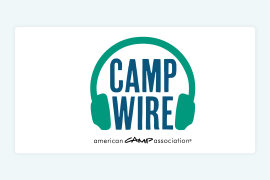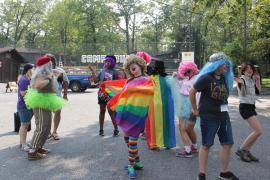ACA: Can you tell me a little bit about Camp Akita and the history of the First Community Church?
Kientz: Camp Akita is owned by First Community Church, which is a large, progressive Christian church in Columbus, Ohio. First Community bought the land for Camp Akita in 1949, so the summer camp has been a big part of the church life and history for a long time.
First Community also has a long history of forward-thinking and welcoming and affirming the LGBTQ+ community. We’ve been doing commitment ceremonies for same-sex couples since before same-sex marriage was legal so since the 90s. We are committed to providing safe and affirming spaces for all people — and those spaces include our summer camp and all people includes LGBTQ+ kids.
ACA: Can you tell us a little bit more about your statement that camp is for everyone?
Kientz: We want camp to be for everybody, and that’s what our camp has been about for a really long time. We wanted to put that philosophy into practice and make sure it was clear to everybody that camp is for everyone by coming out with a gender diversity and inclusion policy, which we put out in the spring of 2022.
ACA: What programs do you offer at Camp Akita and who are the campers you serve?
Kientz: Camp Akita is an overnight summer camp for rising third graders through graduated high school seniors. We have different camps for different age groups. The younger you are, the less time you go to camp, and the older you get, the longer you can stay. That’s our traditional summer camp format.
We have two other camp experiences that go on at the same time. We have something called Akita Backcountry which is a smaller group limited to 10 kids each session, and they go live out in platform tents, they cook their own food, they learn wilderness skills, they do more hiking and “roughing it” type of camping. We also have a service leadership program for rising tenth graders through graduating seniors and they live in the main camp and they serve behind the scenes. They clean facilities, serve meals, and set up for activities, and those campers get to stay for two sessions. It’s an incentive for our older kids to come back to camp and see camp from a different perspective and learn about service and why that’s important.
ACA: Who are the campers you serve?
Kientz: Most of our campers are from the Columbus area. They’re mostly suburban campers, but not all of them. We have kids that come from out of state and from the Logan, Ohio, area (where the camp is located). We provide scholarships because we want camp to be an experience everyone can participate in.
Anybody can register. It’s owned by the church — so there is a priority registration period for church members’ kids — but those kids only make up about 15 to 20 percent of our campers. About 80 percent of our campers are folks from the wider community who are not part of the church.
ACA: What is your history at camp? Tell me more about yourself!
Kientz: I started going to Camp Akita as a camper. I went for the first time when I was going into ninth grade. I was one of those homesick kids we are all so familiar with, so I didn’t do an overnight camp for a really long time, and finally going into high school I was ready for that experience. I went and spent a week there and fell in love with it.
I did the service leadership program later in high school and when I was in college started working there as a counselor. I’ve been involved in Camp Akita in some way every summer since then — as a counselor, a member of the leadership team, an assistant director, and now the director. I’ve been there for a long time and been able to see different sides of camp, which has given me a good perspective, and now I’m the person who helps those homesick campers.
ACA: Can you talk about your personal commitment to the gender diversity and inclusion statement and to LGBTQ+ campers?
Kientz: As long as I can remember and as long as I’ve been involved at Camp Akita, there have been members of the LGBTQ+ community who are part of the fabric of camp. A few of my counselors growing up were gay, and it was lovely and accepted as part of who they were. It wasn’t an off-limits topic. I’m not part of the LGBTQ+ community myself — I’m an ally — but camp has given me an opportunity to know so many different members of the LGBTQ+ community.
One of the things we talk about at camp a lot is meeting the campers where they are. Wherever the campers are in their journey of life, whatever they want to talk about, our role as staff members is to meet them there and be in that space with them, be present with them, and remind them that wherever they are matters.
We‘ve talked to our counselors about creating spaces where we are welcoming campers to use and introduce themselves using their pronouns. We think that’s really important. We want that to be not intimating, especially for campers who have never been asked the questions “what are your pronouns?”
One of the pieces of advice that Chris Rehs-Dupin introduced to us was playing games where you are invited to use your pronouns — so, for example, passing a ball around and talking about yourself in the third person, like: “This is Sarah, and she likes strawberries.” It allows you to use your own pronouns as a way to introduce yourself but it’s a game, it’s fun, it’s camp, and we’re getting to know each other. Create spaces where it’s not intimidating to introduce yourself.
ACA: How did you get buy in from the community, board, and church leaders to do the work around LGBTQ+ youth?
Kientz: The biggest factor in deciding to create the policy was that we were already serving kids who identify as trans* and nonbinary. There had been kids who were out as trans* or nonbinary and families were asking us how they should register their kid and where they should live, and we were working with those families on a case-by-case basis. This past spring when we started registering families for 2022, we had yet another family come to us and say their child registered as a girl last year and was in a girls’ cabin and now was ready to be in a boys’ cabin. And I had this moment of deciding we needed to have a policy. We needed to create accommodations for everybody and not wait for camper families to come to us but instead making it clear what we believe in — because there could be families with campers who are already coming to camp or who do not have a camp, and I wanted them to be able to see what we’re already doing and not wait for people to come and raise their hand.
One of the first steps was turning to the leadership of the church and telling them we were thinking about putting out this policy to make it clear we are welcoming of kids who are gender diverse or gender minorities. The response was “aren’t we already doing that?” And it was like “yes, we are already doing this. We just want to make it clear that we’re doing this.”
I said, “we might get some pushback on this. We might get people call in with a lot of questions or who are upset.” They said, “yeah, but this is absolutely the right thing to do, so let’s do it.”
So it was kind of a no-brainer from the leadership here, which was great.
ACA: Can you take about your process from the time you made the decision to create the policy up until the point of all the steps you took to get there?
Kientz: Our registration started in January and we’re very lucky that when registration starts, it fills up pretty quickly. So in January most of our sessions were completely full, but we’d had conversations with families about how trans* campers should register, and that’s when we decided to come up with the policy.
Then we went to the ACA National Conference in February, and I saw that there were multiple sessions about inclusive housing and gender and inclusivity, so I went to all those sessions. I met Chris Rehs-Dupin who founded Transplaining for Camps, and Chris in his sessions was so affirming and encouraging. One of his messages is that just taking steps toward accepting and creating welcoming spaces for trans* and nonbinary campers is awesome. You don’t have to change buildings — you can do this with what you have. And I was like “yes we can!” I felt very encouraged.
I came home and wrote the policy. I searched other camps who are two or three steps ahead who already have gender-inclusive housing and policies like these and I borrowed a lot of their language and adapted it to fit our camp and what our setup is.
We talked to Chris again and he consulted with us, and then we were ready to publish our policy. One thing Chris recommended was to sit down and think about all of the things that could come up from parents or families — questions that might seek clarification or questions that might come from people who have no knowledge of the LGBTQ+ community, people who have never thought about gender diversity and inclusion before, and people who might be coming from a place of fear and anger. Write out what you think their questions will be and then answer all of those. Put it in a document somewhere and have your talking points so that when and if those questions come up, you will have something to look at that you already created from a place of when you were calm. So that was great advice, and we did that.
We published our policy on March 31, 2022, which was Trans Day of Visibility. We wanted it to feel celebratory. We wanted it to feel like we’re celebrating campers who are trans* or nonbinary or gender diverse in any way. We celebrate them. We see them on this day of visibility. We want to make people know that we see them, and they’re loved, and camp is for them. So we published the policy on that day and put it on our website and social media.
We got an overwhelmingly positive response. People reached out to say “this is so awesome.” Other people reached out and said “I thought this was already your policy,” which was great.
And we also got a lot of calls from people who were not happy about it; who were upset that this was our policy; who were really fearful; or who just didn’t know and had never thought about how there are kids who need a policy to know they’re included, which is unfortunate.
We had to field a lot of phone calls, but in the end, only about 35 or 40 families decided to pull their kids out of camp out of 1,500 campers.
The people who were upset about it — their voices were loud. Their phone calls were not happy. But the vast majority of our campers knew what we believe in and who we are, and this was not a surprise to them. I think a lot of the families who ended up pulling their campers out of camp in many ways didn’t know who we were and what our philosophy and theology and belief system is. Many of them wanted us to change this policy, and we were like “No. This is what we’re already doing, and we’re just making it clear.”
ACA: Can you tell me about how you navigated those calls or some of the verbiage you used with those people?
Kientz: A really important thing was just listening to what their concerns were, because some of them were concerned about things like “I don’t want my child to see anybody else’s naked body.” It was like “yes, I do not want any child to see anyone else’s naked body. We are on the same page with that.” So some of the concerns we were on the same page about and explained what we’re doing to make sure that doesn’t happen: We have changing rooms with a solid, closeable door in every single cabin; no public nudity is allowed and kids have to use a changing space.
They were concerned about bathroom usage — again, lockable stall doors.
The only physical thing we had to add for camp this summer is that we put lockable stall doors on our showers — we used to just have curtains — but otherwise our facilities did not have to change for this policy to go into effect.
Some families who had been familiar with Camp Akita for a long time just needed to know that. A lot of the phone calls were just answering questions like that.
Other ones were much harder to listen to. I had many calls with Chris Rehs-Dupin to call and update him. And he said things like, “you have to protect yourself. You are not there to just listen to people’s transphobic comments. You can say things like ‘it sounds like we have different beliefs and that Camp Akita is not a value match for your family at this time.’” That is such great advice, and I love the phrase “not a value match” because it’s not saying our values are better than your values. It’s just saying that we are not a value match right now, and if something changes, we will still be here. You’re not barred from camp. We hope you find a different space for your kid to have a great summer camp experience. But if we’re not a value match for you right now, that’s OK.
One other thing I’ll say is that I remember one call that came from a family that are members of the church and have been going to camp forever, and they had requested a phone call back. I thought that was unusual and I was surprised they wanted to talk about it. They said “we accept the policy, we are completely on the same page as you, but because there’s been a lot of chatter in the community about Camp Akita right now, we’re just worried that camp is now different. Is Camp Akita still the same?” And I was like yes, we are still going to play capture the flag. We are still going to eat grilled cheese. We are still going to go canoeing on the lake. The programming is the same. We have not become an LGBTQ+-only camp. Our programming is the same. It’s still for everyone. You know what our camp is, and it’s not different or changed because we’re saying we accept everybody. We want this summer camp experience that you know to be for everyone.
ACA: What advice would you give to camp professionals who are looking to do this work?
Kientz: My first and maybe biggest piece of advice is before you try to create any policies, before you try to figure out if there’s a place for a changing room in the cabin or anything like that, take the time to reflect on whether you believe camp is for everyone, and whether you believe trans* kids and gender diverse kids belong at your camp. And if the answer is yes, they absolutely belong there, then everything else will be easy after that.
The first step is believing with your whole heart that those kids belong at your summer camp, and the policies will fall into place. But if you get any pushback, which you probably will – there will probably be a family or two that either in best case scenario has questions about your policy and worst case scenario will want to call and tell you all the reasons why you’re wrong – knowing with your whole heart that trans* and nonbinary kids and all kids no matter who they are, knowing that all kids belong at your summer camp is absolutely the first step of doing this.
This can be really challenging and lonely work, so reaching out to organizations like Transplaining for Camps and having people help you is worth every penny. I would welcome if people have questions and want to chat to reach out to me. My email address is [email protected].
One of the things that was so helpful to me was just explore other ACA camps that already have gender inclusive policies, that already have all-gender cabins. What are other camps doing? You can get a lot of inspiration. You can reach out to other camp professionals. Please do that because we’re in this together. We all believe that camp is for everyone together. Let’s lean on each other to do that.
Interview conducted by Alicia Danenberg, ACA content director. This interview has been condensed and edited for clarity.
Rev. Sarah C. Kientz is a minister to youth for First Community Church and director of Camp Akita.
The views and opinions expressed by contributors are their own and do not necessarily reflect the views of the American Camp Association or ACA employees.




